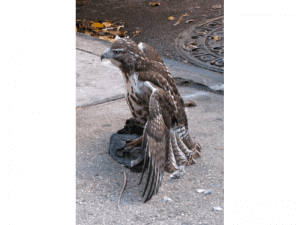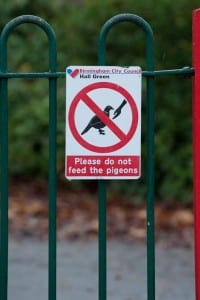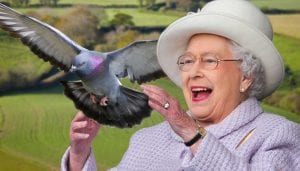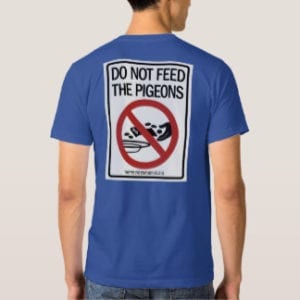
by Pigeon Patrol | Jul 29, 2016 | 4-S Gel Bird repellent, Bird Netting, UltraSonic Bird Control
 FEATHERS have been ruffled after peregrine falcons were encouraged to nest at Beverley Minster.
FEATHERS have been ruffled after peregrine falcons were encouraged to nest at Beverley Minster.
Garden bird lovers and pigeon fanciers have criticised the church for allowing the RSPB to install a bird box on top of the minster.
The box was installed this month after a pair of peregrines were spotted in residence at the minster.
But Beverley resident Annie Cox, 69, who lives near Beverley Minster, claimed the falcons are preying on song birds.
She said: “When we moved to Minster View we were delighted to wake to the dawn chorus.
“It was wonderful until summer, when falcons were introduced to control feral pigeons around the minster, we had blackbirds raising their young and variety of small birds – even the endangered sparrow.
“I’m disabled with severe osteoarthritis and had great pleasure watching birds at the feeder in the front garden. Now there are no birds to eat the seed.”
Mrs Cox said she has put up net curtains so she cannot see piles of feathers in the garden.
She said: “All that is left are piles of feathers and one pair of blackbirds and wood pigeons in our garden.”
Mrs Cox said she was distressed when she found out peregrine falcons were being encouraged to nest at the minster.
She said: “Falcons and other raptors have no place in towns and should be returned to their natural environment in the countryside where they can live on rabbits and rodents rather than decimating the small bird population, which is already at risk.”
Local pigeon fanciers are also upset about the peregrine falcons preying on other birds.
John Baker, who keeps racing pigeons, said: “It is very nice to see peregrine falcons flying, but they eat pigeons and song birds.
“They pluck them alive and pull them apart.
“Churches are not their normal habitat and I personally think the vicar is out of order letting this happen. Is he not supposed to love all creatures?”
Minster Vicar Reverend Jeremy Fletcher said: “I am not an expert, but I think sparrowhawks have much more impact on garden birds.
“The peregrines adopted the minster towers last year as a place to roost and hunt from. They came of their own accord.
“It appears peregrines are protected so if you have them you can’t do anything about that, you are required by law not to affect them.
“One of the reasons it is good for us is having peregrines at the building scares off feral pigeons, which cause damage to the stonework.”
About Pigeon Patrol:
Pigeon Patrol Products & Services is the leading manufacturer and distributor of bird deterrent (control) products in Canada. Pigeon Patrol products have solved pest bird problems in industrial, commercial, and residential settings since 2000, by using safe and humane bird deterrents with only bird and animal friendly solutions. At Pigeon Patrol, we manufacture and offer a variety of bird deterrents, ranging from Ultra-flex Bird Spikes with UV protection, Bird Netting, 4-S Gel and the best Ultrasonic and audible sound devices on the market today.
Voted Best Canadian wholesaler for Bird Deterrent products four years in a row.
Contact Info: 1- 877– 4– NO-BIRD (www.pigeonpatrol.ca)

by Pigeon Patrol | Jul 28, 2016 | Bird Deterrent Products, Pigeon Patrol's Services, Pigeons in the News
 FEEDING the birds costs “tuppence a bag” in the classic film Mary Poppins, but one woman has been fined £640 for putting out food for the pigeons.
FEEDING the birds costs “tuppence a bag” in the classic film Mary Poppins, but one woman has been fined £640 for putting out food for the pigeons.
Katherine Spiller was handed a community protection notice by Oxford City Council in February last year after neighbours complained about the large numbers of pigeons congregating around her home.
But the “habitual bird feeder” failed to abide by the notice and continued to put seed out in her garden in Temple Street, east Oxford, a court heard.
Magistrates were shown pictures of dozens of pigeons perched on the roof and window ledges of the terraced house, and even sitting on neighbouring buildings.
Jeremy Franklin, representing Oxford City Council, said 66-year-old Spiller flouted the notice eight times between August and October last year.
He told Oxford Magistrates’ Court on Monday how neighbours reported Spiller to the council for continuing to put out bird seed.
Mr Franklin added: “The defendant is an habitual feeder of birds, mostly pigeons, which congregate around her house in large numbers, causing a certain amount of distress and antagonism to the neighbours.
“The warning notice required the defendant to cease dropping bird seed or foodstuffs that would encourage birds, vermin or other animals in her garden or anywhere and to keep her garden free from weeds and plants providing shelter to vermin and other animals.
“Despite the imposition of the notice, the defendant was found to have breached it by continuing to feed the pigeons.”
Mr Franklin said the city council might have to take further action to stop Spiller from feeding the pigeons unless she could change her habits.
He added: “Those charged with dealing with this problem are at their wits end.”
The court heard Spiller had sent a letter to the court, admitting she had failed to comply with a community protection notice.
But the court clerk said the letter was “very, very rambling” and mainly consisted of “poems that have been written by Ms Spiller”.
The panel of magistrates handed Spiller – who did not attend the hearing – a fine of £640 for breaching the order.
About Pigeon Patrol:
Pigeon Patrol Products & Services is the leading manufacturer and distributor of bird deterrent (control) products in Canada. Pigeon Patrol products have solved pest bird problems in industrial, commercial, and residential settings since 2000, by using safe and humane bird deterrents with only bird and animal friendly solutions. At Pigeon Patrol, we manufacture and offer a variety of bird deterrents, ranging from Ultra-flex Bird Spikes with UV protection, Bird Netting, 4-S Gel and the best Ultrasonic and audible sound devices on the market today.
Voted Best Canadian wholesaler for Bird Deterrent products four years in a row.
Contact Info: 1- 877– 4– NO-BIRD (www.pigeonpatrol.ca)

by Pigeon Patrol | Jul 27, 2016 | Animal Deterrent Products, Pigeon Patrol's Services, Pigeon Spikes
 Police arrested a Gonzales man accused of attempted strong-arm robbery after a foot chase Monday in a residential neighborhood near Sunnyslope Road.
Police arrested a Gonzales man accused of attempted strong-arm robbery after a foot chase Monday in a residential neighborhood near Sunnyslope Road.
Police arrested Elliot Turpin, 25, on suspicion of residential burglary and attempted strong-arm robbery after a foot chase and neighborhood search, according to a statement from Hollister police.
According to the statement:
On the morning of February 22, 2015, officers responded to two separate theft-related calls in the 1400 block of Sunnyslope Rd. and Diablo Rd. One of those incidents was an attempted strong-arm robbery. Officers conducted investigations and were following up on leads in those cases.
At 11:00 am officers were called to a nearby neighborhood in the 1600 block of Bodega Ct. Officers responded to a report of an interrupted residential burglary. Officers descended on the area and located a suspect, later identified as Elliot Turpin, jumping fences away from the victim’s house towards neighboring residences. Officers purusued Turpin on foot over fences and through backyards. Respondin officers, with the assistance of deputies from the San Benito County Sheriff’s Office, surrounded the neighborhood and began conducting a yard-to-yard search for Turpin. Turpin continued trying to evade officers by jumping between backyards, but he was soon cornered and arrested without further incident.
Officers were able to link Turpin to the theft related incidents earlier in the day, along with fresh residential burglaries. Turpin is on probation in Monterey County for a prior burglary conviction.
Turpin was booked at the San Benito County Jail on charges of burglary, attempted robbery, possession of stolen property, resisting arrest, and probation violations.
About Pigeon Patrol:
Pigeon Patrol Products & Services is the leading manufacturer and distributor of bird deterrent (control) products in Canada. Pigeon Patrol products have solved pest bird problems in industrial, commercial, and residential settings since 2000, by using safe and humane bird deterrents with only bird and animal friendly solutions. At Pigeon Patrol, we manufacture and offer a variety of bird deterrents, ranging from Ultra-flex Bird Spikes with UV protection, Bird Netting, 4-S Gel and the best Ultrasonic and audible sound devices on the market today.
Voted Best Canadian wholesaler for Bird Deterrent products four years in a row.
Contact Info: 1- 877– 4– NO-BIRD (www.pigeonpatrol.ca)

by Pigeon Patrol | Jul 26, 2016 | Bird Deterrent Products, Bird Netting, Pigeon Patrol's Services
 Animal welfare officers who rescued a lost pigeon in East Lothian were in for a surprise when they discovered in belonged to the Queen.
Animal welfare officers who rescued a lost pigeon in East Lothian were in for a surprise when they discovered in belonged to the Queen.
The Scottish SPCA was called when the exhausted bird was spotted at Traprain Terrace in Haddington on February 2.
Staff traced it back to its owner and the racing pigeon has now been returned to the royal loft on the Sandringham estate in Norfolk.
The bird was identified by a ring number on its leg.
Connie O’Neill, Scottish SPCA animal rescue officer , said: “I’ve rescued many pigeons during my career with the Scottish SPCA but this was certainly a first for me.
“I was really excited when I found out it was one of the Queen’s racing pigeons.
“We were able to identity where the pigeon had come from using the ring number on its leg and arrangements were made for it to be collected.
“The poor bird was exhausted and it was a cold, dark and windy night when it was found. Thankfully someone contacted us as it would have been very easy prey for a cat.
“It’s quite common for racing pigeons to lose their way and become too tired to take off again. I’m really glad we were able to help in this instance.”
About Pigeon Patrol:
Pigeon Patrol Products & Services is the leading manufacturer and distributor of bird deterrent (control) products in Canada. Pigeon Patrol products have solved pest bird problems in industrial, commercial, and residential settings since 2000, by using safe and humane bird deterrents with only bird and animal friendly solutions. At Pigeon Patrol, we manufacture and offer a variety of bird deterrents, ranging from Ultra-flex Bird Spikes with UV protection, Bird Netting, 4-S Gel and the best Ultrasonic and audible sound devices on the market today.
Voted Best Canadian wholesaler for Bird Deterrent products four years in a row.
Contact Info: 1- 877– 4– NO-BIRD (www.pigeonpatrol.ca)

by Pigeon Patrol | Jul 25, 2016 | Animal Deterrent Products, Pigeon Patrol's Services, Pigeons in the News
 People offering grains to feral Common Pigeons (Columba livia) at designated kabutarkhanas or illegitimate feeding places are a common sight these days. It may seem to be a noble deed and is also perceived to be so by many. Hundreds of pigeon-lovers are seen flocking around the grain sellers to purchase the grains to be fed to the pigeons. Mostly such feeding stations are adjacent to places of worship. There are many people who have created mini feeding stations in the balconies, on the window ledges or terraces.
People offering grains to feral Common Pigeons (Columba livia) at designated kabutarkhanas or illegitimate feeding places are a common sight these days. It may seem to be a noble deed and is also perceived to be so by many. Hundreds of pigeon-lovers are seen flocking around the grain sellers to purchase the grains to be fed to the pigeons. Mostly such feeding stations are adjacent to places of worship. There are many people who have created mini feeding stations in the balconies, on the window ledges or terraces.
A large number of people feed pigeons for religious reasons, thinking that by feeding pigeons they are helping the birds and perhaps this helps in washing away their sins. People also believe that feeding pigeons brings prosperity to those who feed them. There are others who feed pigeons thinking that pigeons are hungry, need food and would not survive unless fed by them. Grains are purchased and literally scattered in heaps for the pigeons to feed. Such artificial feeding has led to overpopulation of pigeons that is much beyond the carrying capacity of any place.
AT A GLANCE
The global population estimation of Common Pigeons is c.26,00,00,000 (as per BirdLife International and IUCN).
In one of the citizen science programmes launched to monitor common bird species of India, Common Pigeon topped the list with House Crow following at number two.
It is quite obvious that pigeons are doing very well in cities like Mumbai, thanks to the compassion of many citizens.
Do you wonder what keeps the populations of bird species in the wild balanced, be it a pigeon or an eagle? Food chain, to a great extent, regulates relative abundance of each species based on their reproduction, deaths and predator-prey relationship. In case of feral pigeons, in cities like Mumbai, there is a problem of plenty. In the wild, the Common Pigeon (previously known as the Blue Rock Pigeon) is seen around cliffs and rocky areas, which they prefer for nesting. However, in cities and towns their preference for naturally occurring cliffs has been replaced by parapets, AC compressor units and any such flat surface in city buildings where pigeons seek shelter. Due to the constant availability of food, pigeons have started nesting throughout the year; unlike in the wild where nesting season coincides with the food availability in nature. Predatory birds help in keeping the population of pigeons in control by feeding on them in the wild. But unfortunately urbanisation has practically wiped out the predatory birds from most city limits.
Had it been not for our compassionate feeding, the pigeons would have survived anyway but in lesser numbers, enough to be sustained on the natural food availability in and around the cities. By providing them with ready food, pigeons in cities have lost their natural ability to scavenge and survive on their own. Scavenging for food is an important exercise for wild birds that they must indulge in. Such ‘compassionate’ feeding may attract birds (and also rodents like rats and mice) close to you but may also result in nutritional deficiencies in birds. Let the birds decide what they wish to feed on instead of us deciding what they should feed on!
The population explosion of pigeons in cities and towns is a serious trend that is slated to grow in future as there is no dearth of food offered to them and nesting sites in cities. Lots of pigeons around may make some people happy but doctors and veterinarians have often expressed concerns over this issue and advise refraining from feeding pigeons.
Dr Alice Bacon at Fraser and Fraser Vets Ltd, Dingwall, Scotland.
Many people enjoy feeding and watching wild birds, but are unaware that their actions may inadvertently cause more harm than good; supplementary feeding supports unnaturally large pigeon populations, and this over-crowding can cause disease outbreaks in pigeons, other wild birds and humans.”
Keeping leftover food or other food stuff in the balcony for other species of ‘hungry’ birds should also be reassessed and probably discouraged. Veterinarians warn that such bird feeders may act as a nodal point of disease spread to other species of birds for emerging diseases of infectious nature.
Dr Olga Nicolas of Vallcalent Wildlife Rescue Centre in Spain.
It may have a zoonotic risk like Salmonella, Chlamydia, hemoparasites though hippoboscid flies etc.”
As the faecal matter gets dried up it forms fomites which could travel in air facilitating spread of infection. Symptoms of coughing, rhinitis, arthritis and headache could easily be encountered. People in the vicinity of pigeons and their droppings are at the highest risk of catching infection. Other species of birds are at great risk of mutually getting infected as well and it would make the infection to persist for longer. On the other hand, birds quickly get used to our food, which obviously is not their natural food. Also, birds not feeding naturally might affect the ecological food chain as they may not eat the fruit which only germinates when it passes through that bird’s intestine. Our ignorance in these matters can have serious consequences that we may not be even aware of. Then why should we interfere with their routine of scavenging for food? “The natural balance of wildlife populations is very sensitive, and we must be careful of how our interactions affect them”, says Dr Bacon.
Don’t get discouraged as a bird lover! You certainly have a role to play as there are many ways of helping in the conservation of birds. Misplaced compassion is not conservation and often does not help. Planting, nurturing and protecting plant species that provide shade, perches, nesting places, fruits and flowers for wild birds is a more sustainable and a logical way to help in bird conservation than artificially feeding wild birds. There are several other ways of getting involved in the conservation of birds. But of course, it requires you to move out of the comfort of your homes and venture out into the wilderness.
As long-term measures, getting involved in wildlife conservation agencies in personal capacity as volunteers, supporting the community at the fringe of protected areas and organising nature clubs and awareness trails on bird conservation for students, are options which you could consider to make an impact on overall bird conservation.
We sincerely appeal to the concerned authorities to take note of the potential health hazards and ecological ramifications associated with feral pigeons and take immediate steps to close down the kabutarkhanas and other pigeon feeding stations. The surplus population of feral pigeons will thus move out elsewhere in the quest for food. Use of some anti-fertility drug or some such means to control the population growth among the pigeons without harming them could also be an option to be considered in controlling the growing pigeon populations.
Dr Barbara Vogler from National Reference Centre for Poultry and Rabbit Diseases, University of Zurich, Switzerland.
The problem of city pigeons is well recognised in Switzerland since many years. Most people are aware that they should not feed pigeons and commonly only elderly people still do it and we do have population control programmes in Bern and Zurich.”
Anti-fertility drugs, if given orally as meals, would have to be assessed for their impact on other birds too as consumption by other bird species can’t be totally ruled out. Impact of such anti-fertility drugs would need to be assessed for any possible toxic effects down the food chain too. In the larger interest of pigeons and humans, people from all communities should come together to sensitively address this problem.
Kedar Gore is a biologist and wildlife conservationists by profession for over two decades. Dr. Naveen Pandey is veterinarian with an expertise and experience in rescue and treatment of wildlife species
About Pigeon Patrol:
Pigeon Patrol Products & Services is the leading manufacturer and distributor of bird deterrent (control) products in Canada. Pigeon Patrol products have solved pest bird problems in industrial, commercial, and residential settings since 2000, by using safe and humane bird deterrents with only bird and animal friendly solutions. At Pigeon Patrol, we manufacture and offer a variety of bird deterrents, ranging from Ultra-flex Bird Spikes with UV protection, Bird Netting, 4-S Gel and the best Ultrasonic and audible sound devices on the market today.
Voted Best Canadian wholesaler for Bird Deterrent products four years in a row.
Contact Info: 1- 877– 4– NO-BIRD (www.pigeonpatrol.ca)

 FEATHERS have been ruffled after peregrine falcons were encouraged to nest at Beverley Minster.
FEATHERS have been ruffled after peregrine falcons were encouraged to nest at Beverley Minster.

 FEEDING the birds costs “tuppence a bag” in the classic film Mary Poppins, but one woman has been fined £640 for putting out food for the pigeons.
FEEDING the birds costs “tuppence a bag” in the classic film Mary Poppins, but one woman has been fined £640 for putting out food for the pigeons.
 Police arrested a Gonzales man accused of attempted strong-arm robbery after a foot chase Monday in a residential neighborhood near Sunnyslope Road.
Police arrested a Gonzales man accused of attempted strong-arm robbery after a foot chase Monday in a residential neighborhood near Sunnyslope Road.
 Animal welfare officers who rescued a lost pigeon in East Lothian were in for a surprise when they discovered in belonged to the Queen.
Animal welfare officers who rescued a lost pigeon in East Lothian were in for a surprise when they discovered in belonged to the Queen.
 People offering grains to feral Common Pigeons (Columba livia) at designated kabutarkhanas or illegitimate feeding places are a common sight these days. It may seem to be a noble deed and is also perceived to be so by many. Hundreds of pigeon-lovers are seen flocking around the grain sellers to purchase the grains to be fed to the pigeons. Mostly such feeding stations are adjacent to places of worship. There are many people who have created mini feeding stations in the balconies, on the window ledges or terraces.
People offering grains to feral Common Pigeons (Columba livia) at designated kabutarkhanas or illegitimate feeding places are a common sight these days. It may seem to be a noble deed and is also perceived to be so by many. Hundreds of pigeon-lovers are seen flocking around the grain sellers to purchase the grains to be fed to the pigeons. Mostly such feeding stations are adjacent to places of worship. There are many people who have created mini feeding stations in the balconies, on the window ledges or terraces.